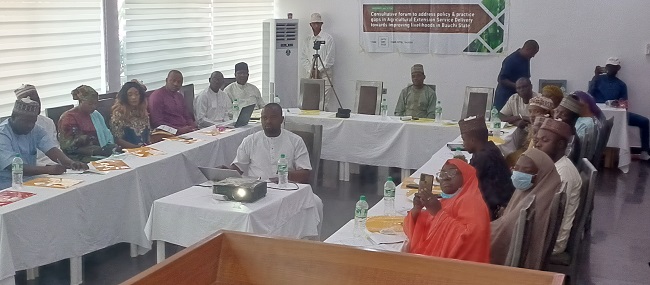Bauchi yet to maximize agricultural production potential for economic growth, improved livelihood ― CISLAC laments
[ad_1]
Though Bauchi state is host to a large population of farmers and a huge potential for scaling development through significant investment in Agriculture, it is yet to maximize its agricultural production potential towards economic growth and improved livelihoods.
This is for several reasons, including policy and practice limitations in implementing unified agricultural extension services for increased productivity and better living standards for small-scale farmers.
The observation was made by the Executive Director, of the Civil Society Legislative Advocacy Centre
(CISLAC), Auwal Ibrahim Musa (Rafsanjani) in his opening remarks at Consultative Forum to address policy and practice gaps in Agricultural Extension Service delivery towards improving livelihoods in Bauchi State held at Yimir Hotel, Bauchi on Thursday.
According to him, “As you may know, the state government on its part has demonstrated some zeal to support agricultural development through gradual upward reviews of its agriculture budget annually”.
He added that “The efficacy of any agricultural extension is a function of the policy environment, the level of mass adoption and spread of modern and scientific practices among farmers in rural communities”.
He added that “To accelerate agricultural development, there needs to be an enabling policy environment in which farmers must adopt the increased use of improved inputs through the combined efforts of the inputs agencies and functional extension service delivery system”.
Represented by Programme Officer, Tax Justice, Environment & Conservation of Nature, CISLAC /Transparency International – Nigeria, Muna Ugochukwu, Auwal Musa added, “But within the present policy administration with budget limitations, weak inter-agency and public-private collaborations, low ICT integration and limited extension agents for small-holder farmers (SHFs), Bauchi state farmers receive limited guidance and training in technology adoption and application of inputs, resulting in low productivity, reduced export opportunities and threatened livelihoods”.
“It is on this premise that CISLAC with support from Oxfam within the framework of its Together Against Poverty project. Through TAP, Oxfam is advocating for African leaders at all levels to make progress toward meeting their Comprehensive African Agricultural Development Programme (CAADP) commitments”, he added.
He also said that “It is to put in place measures and strategies to build resilient food systems in the face of shocks and stressors such as COVID-19, climate change, and other current crises (e.g. conflicts) and Promote gender justice and women’s economic empowerment”.
The CISLAC ED added that “We are thus convening this forum to amongst other things contribute to improving productivity and livelihoods of small-holder farmers in the state by identifying the dimensions and drivers that limit the implementation of Extension services”.
It is to also locate opportunities within policy frameworks and practices that can contribute effectively to its delivery; and chart a course of collective action.
He concluded by saying, “As we look forward to successful deliberations, please accept the assurances of our highest regards”.
In brief remarks, the Director, Technical and Cooperation of the State Ministry of Budget and Economic Planning, Umar Umar Mohammed said that as the coordinating ministry, it is responsible for partnerships from national and international development partners for effective implementation.
He said that the meeting was timely considering the food crisis in the country which is forced by the rebranding of the country’s currency notes as people are bringing out kept money to buy up anything in the market including raw foodstuffs.
Umar Mohammed observed that though Bauchi State has joined the league of oil-producing communities in the country, there is a need for the development of the agricultural sector.
ALSO READ FROM NIGERIAN TRIBUNE
Bauchi yet to maximize agricultural production potential for economic growth, improved livelihood ― CISLAC laments
[ad_2]















Post Comment